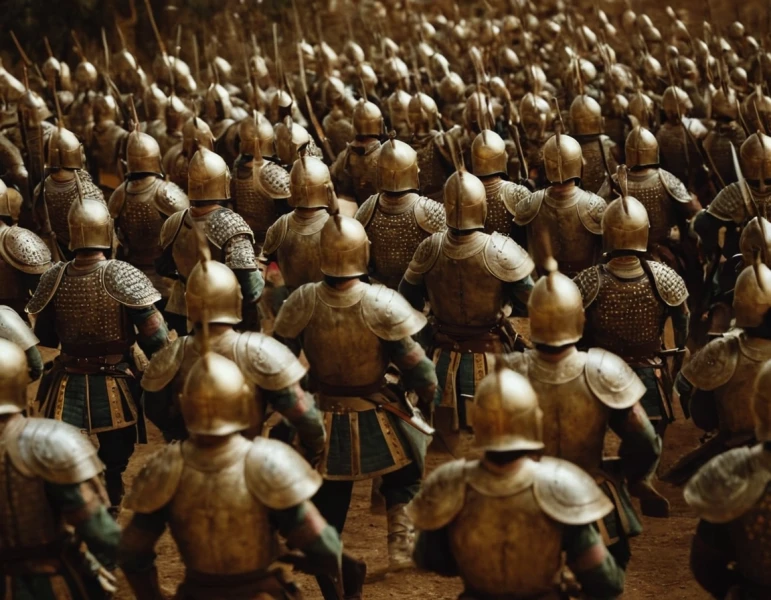Educa UNIVERSITY|ART AND ARCHITECTURE
The Art of War: An Unexpected Guide to Modern Life
Related Masters
The Art of War: An Unexpected Guide to Modern Life
When you hear about "The Art of War," you probably imagine something old-fashioned, a manual of military tactics written more than 2,000 years ago by a Chinese general named Sun Tzu. But let me tell you something, my friend: this book is much more than that. Not only has it survived millennia of change, but today it is an inexhaustible source of wisdom applicable in almost any area of life. Yes, as you hear it!
War is more than bullets and cannons

Throughout my life, I have encountered many situations that could be described as "battles."
War is more than bullets and cannons

Throughout my life, I have encountered many situations that could be described as "battles. Some, in fact, were. Others, rather, were business conflicts, personal problems or challenges that made me feel as if I were on a battlefield. On all those occasions, the teachings of "The Art of War" were presented to me as a guide to survive and thrive.
Do you want to know how? I'm going to tell you!
Strategy and planning: The Key to Success
One of Sun Tzu's most important principles is strategic planning. Before entering into any conflict, whether it is a literal war or a commercial dispute, it is essential to know the terrain and your adversary well. Sun Tzu said: "If you know the enemy and know yourself, you need not fear the outcome of a hundred battles." This advice, as simple as it is powerful, can be applied to business or even personal relationships.
Why? Because knowing both your competitors and yourself thoroughly allows you to anticipate their moves and adapt yours accordingly. Accurate and up-to-date information is your best ally, something that remains true today, when data is everything. The difference between winning and losing, as in war, can depend on a single click at the right time.
Flexibility and Adaptability: Being Like Water
Another fascinating aspect of the book is flexibility and adaptability. Sun Tzu teaches us that there is no one-size-fits-all strategy; it is vital to adapt to changing circumstances. If you are rigid like a tree, you will break at the first hard blow; but if you are flexible like water, you will be able to flow and change shape to adapt to any challenge.
In my experience, both in literal warfare and in the challenges of everyday life, this teaching has been fundamental. Plans are made to be changed, don't fall in love with them. Instead, look at the big picture, analyze every move of the "enemy" (your competition, your problems, your fears) and change course when necessary. It's better to change direction than to stand still waiting for impact!
The Art of Deception: Not everything is what it seems
Let's talk about deception. Sound bad to you? Well, Sun Tzu said that war is based on deception: when you are capable of attacking, appear incapable; when you are close, make believe you are far away. This principle, which on the battlefield can be devastating, also has its applications in day-to-day life.
I don't mean deceiving people in a dastardly way, don't get me wrong! I mean being shrewd, not showing all your cards early on, saving your strategic moves until the time is right. Think about how companies play with their announcements, launches and novelties: always looking to surprise, always keeping the "enemy" (their competitors) off balance.
Leadership: Motivate and you will lead to victory
Sun Tzu also devoted a good deal of space in his work to the topic of leadership. According to him, a good leader is not only the one who gives orders, but the one who inspires and guides his team to victory. This means being able to make quick decisions, lead by example and have the trust of your troops (or employees, partners, friends, family... whoever!).
Personally, I have learned that leading is not just about saying "Follow me!", but also about listening, motivating and, above all, staying calm in the midst of chaos. A good leader knows that his team is as important as himself and that, in many cases, true strength comes from unity.
Intelligence: Knowledge is Power
Did you know that one of Sun Tzu's greatest secrets was the use of intelligence? And no, I'm not talking about how much you know, but how much you can discover. For Sun Tzu, espionage was one of the keys to success in war. Having accurate information about the enemy, about the terrain and the conditions under which the battle is being fought, is critical to winning.
Today, intelligence is still vital, although instead of spies we employ data analysts, market research and predictive algorithms. Information is power, and he who knows the most, the most likely to win.
Modern applications of The Art of War
The amazing thing about "The Art of War" is that its teachings are not limited to the military realm. From Napoleon to modern corporate leaders, many have found this book a source of inspiration for overcoming challenges.Why? Because it's about strategy, planning and, above all, understanding your adversary and knowing yourself.
Conclusion: Live your own war
At the end of the day, war is everywhere. It can be the daily struggle to be better, to overcome a personal problem, to win a contract, or to protect what's yours. "The Art of War" is not just for soldiers or generals; it's for everyone like you and me who fight battles every day. Learn to know your enemy, be flexible, use deception wisely, lead with passion, and remember: the best victory is the one you win without fighting.
The Art of War.
Faculties
Trainings
The faculties embrace diverse academic disciplines and fields of study, opening doors to new perspectives and exploring different spheres of wisdom in a constantly evolving world.














